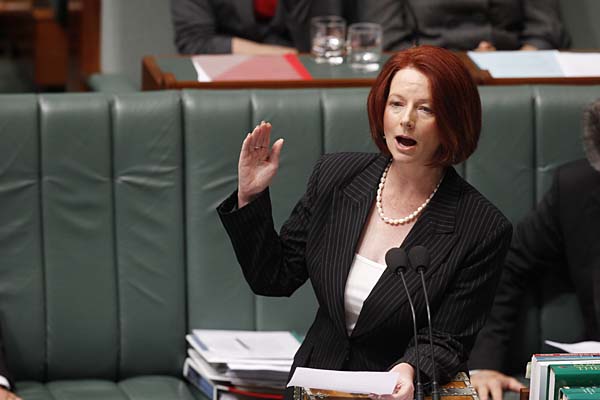Our new Prime Minister looks and sounds the goods. But climate action needs more than smart looks and the right words. [29 June 2010 | Peter Boyer]
Dear Julia
You have shown that in this land of opportunity, women can rise to the top. You showed grace, intelligence and true grit in your first public grilling as Prime Minister, and your swearing-in by our first female Governor-General, Quentin Bryce, was an epoch-changing event.
Many things have no doubt been on your mind in this past tumultuous week. Things like prospects at the next election, voters turning away from Kevin Rudd, the potential damage of a late change of leadership, and how well-prepared you are to take on the mantle.
As Kevin Rudd signalled in his final, defiant media conference as Prime Minister on the night before he quit, “boat people” will continue to exercise the minds of government members as they struggle with a problem that has been distorted by partisan politics and that, in the end, cannot be resolved.
Going back a bit, you’ve probably been preoccupied with your “education revolution” — renewing school infrastructure and equipment and establishing a national education curriculum, and you’ve no doubt given much thought to that other big slice of your outsized portfolio, workplace reform and what might happen to it under an Abbott government.
I’m sure you’ve also been thinking a lot about how big, powerful interests can derail a government and its leader. Your offer to the mining industry of a halt to government mining tax advertising and negotiations — “opening the door” — in return for “opening the mind” and the end of the industry advertising campaign was a hard one to refuse.
What perhaps hasn’t exercised your mind so much is that other big campaign, extending back decades, waged by mining interests and coal-fired energy suppliers against any serious action to curb carbon emissions to lessen the future impact of climate change.
You deserve credit for your forthright support of climate action at your first Prime Ministerial press conference. Unlike Tony Abbott, you are clearly not for turning on this issue. As Prime Minister you have strongly endorsed government support for renewable energy start-ups and said that if you win the next election, putting a price on carbon will be a priority in your next term of office.
This is good, but it’s not enough. For a start, consider your timetable for putting in place emissions trading (not till 2013) when before the last election you planned to have it under way this year, 2010.
Never let it be said that you’re a climate alarmist, but you need to get across some sense that you’re serious about expediting carbon pricing — that it needs to be in place sooner rather than later. I would have thought that by now you’d have enough awareness of the necessary bureaucratic processes to get this moving at least a year ahead of your current deadline.
A delayed start might be excused if you planned to reduce your current scheme’s colossal subsidies, funded by Australia’s taxpayers, to industries most responsible for carbon pollution in the first place, and to limit its reliance on the convenient but ultimately dishonest ploy of unrestricted carbon offsets — paying some undeveloped countries to stop felling their forests.
In fact, if you were to see your way clear to adopt an interim carbon tax scheme, emissions trading could be postponed even further. But given that this would entail some sort of confrontation with big business, it doesn’t look likely. The furious reaction of miners to the resource profits tax has likely put paid to any such act of courage.
There’s another apparently intractable problem concerning large mining and energy interests — what your predecessor so quaintly called “clean coal”. This, as Kevin Rudd and energy minister Martin Ferguson liked to say, would answer all our prayers when it came to cheap, coal-fired electricity. We’d simply capture emitted carbon dioxide and store it underground, for ever.
This is a bit like the idea of perpetual motion — disarmingly simple, and hopelessly impossible to execute. There are limits to what technology can do to rescue us from our excesses, and “clean coal” is one of them. We can’t afford the technology, and even if we could, we don’t have enough suitable underground repositories to safely store this potentially dangerous compound.
This comes to the core of what governments around Australia — around the world — need to do to address man-made climate change. They must draw on people’s ultimate wish to live more sustainably and engage with them, leading them to understand that the old days of limitless energy are gone and that an energy-constrained future is desirable, achievable — and rewarding.
A barrage of advertising reinforces our false assumption that technology can sort it all out — that the latest gizmo, besides answering all our secret desires, will enable us to live as we’ve always lived. Wind turbines, solar panels, electric cars and the rest may help, but they’re not an ultimate solution.
I like what I see. You give every indication that you value people and understand how they can be galvanised into action for a good cause — and that you have the leadership and communication skills to do just that.
Please know that if you articulate the challenge as I’m sure you can, and are seen to be leading the way, people will respond. And good luck.

